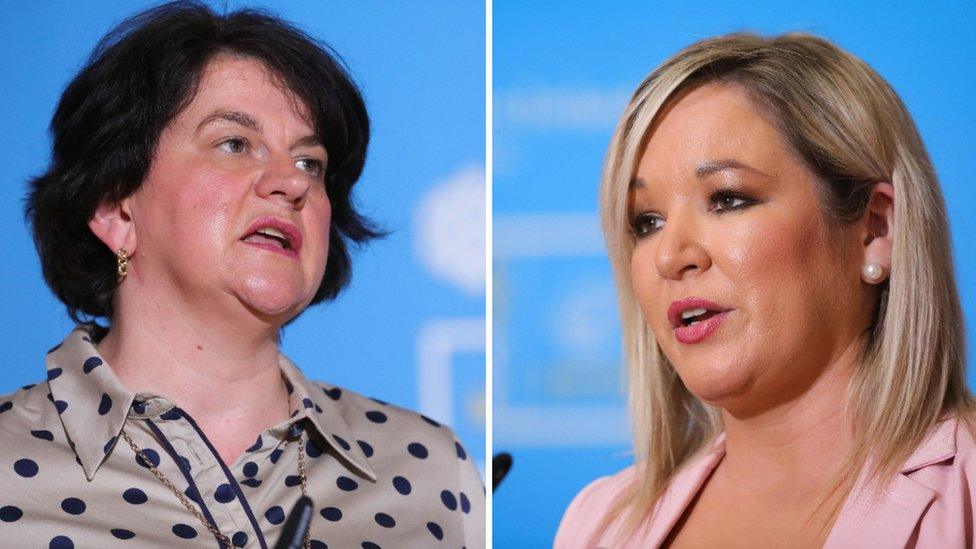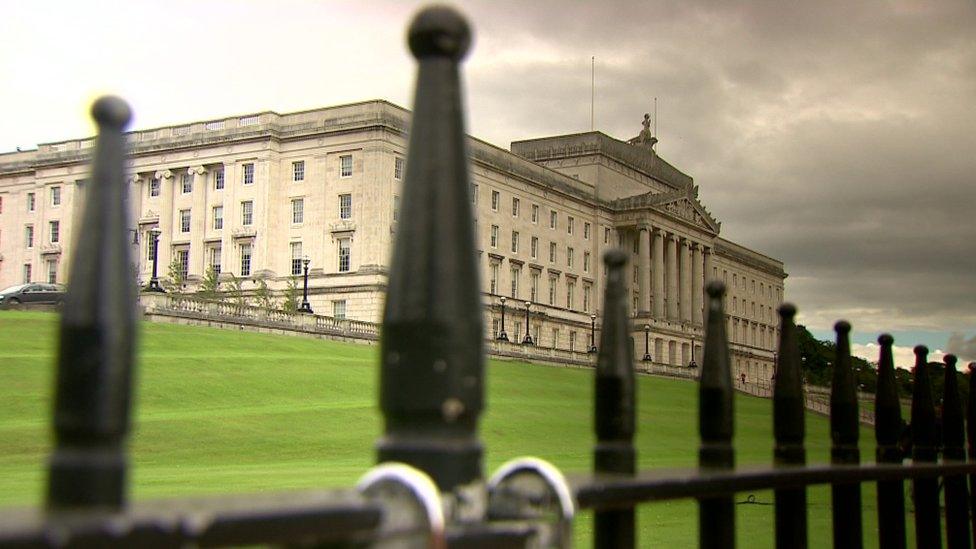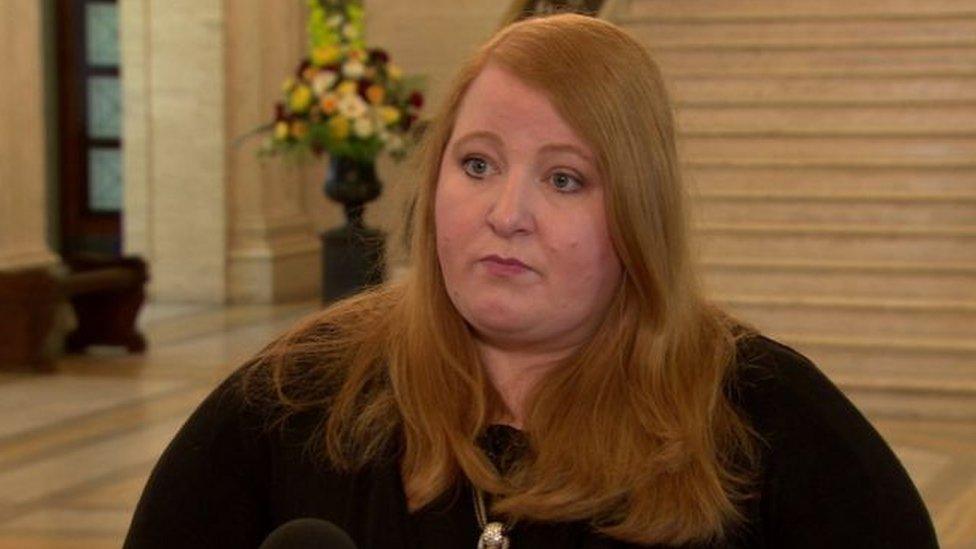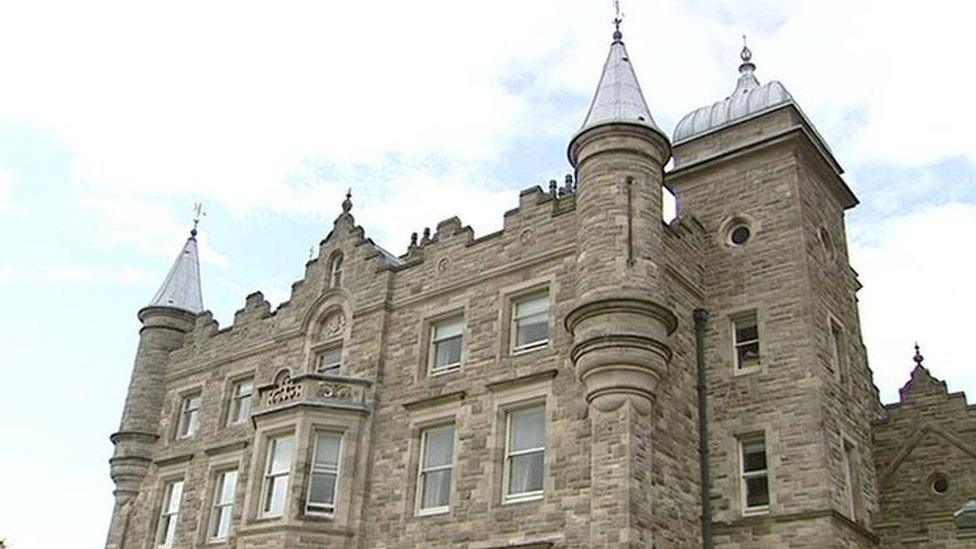Coronavirus: Latest row shows Stormont relations fragile as ever
- Published

Arlene Foster and Michelle O'Neill disagreed once again
If the latest political deadlock - albeit now resolved - tells us anything, it's that the foundations Stormont is built on remain as fragile as ever.
Just after the now-coined "compromise" plan was announced, the SDLP and Alliance said the week of fraught discussions had played out more like a peace process negotiation than the workings of a functioning government.
Outside of the executive, parties had been openly briefing against each other, pointing the finger of blame amid the threat of a looming deadline - sounds familiar?
But the political high-wire drama has played out even more badly with the public this time, and will have done further damage to Stormont's reputation when it comes to trying to manage a global pandemic.
And on top of the questions regarding public confidence in the executive, others are now asking whether what has happened this time is set to be repeated before November ends.
There is now a fundamental divide at the heart of the power-sharing executive over the restrictions, which is likely only to fracture further in the weeks ahead.
The DUP had pushed for all restrictions to end sooner but in the absence of that, at the very least, provide guaranteed dates to businesses so they could begin to plan again.
That goes against what other parties believe, and they point to the advice from health officials which says the coronavirus situation in Northern Ireland is still at a level too unpredictable to commit to opening up again.

Stormont is not unused to deadlock situations - but pressure has been even more intense due to the health crisis
Chief Medical Officer Dr Michael McBride had warned that any extension less than two full weeks would cause excess deaths - a comment Sinn Féin said meant it had changed its mind over the possibility of a compromise deal that had been mooted by Deputy First Minister Michelle O'Neill just days earlier.
Although First Minister Arlene Foster is among ministers to have acknowledged that events of this week have set a new low point for the executive, she says the parties now need to move forward.
After four votes, two vetoes and nasty exchanges, how they do that is anyone's guess.
If pressures on the health service and the spread of the virus continue growing in the next fortnight, Health Minister Robin Swann and his advisers may have to recommend further interventions.
That will bring the executive back to confront the same issue they failed to manage this week - something businesses in Northern Ireland will not relish when their biggest trading season, Christmas, is so close.
'Ministers at loggerheads'
Some businesspeople, well past the end of their tether with the executive, say they just want clear decisions made in a timely fashion - while others, who have not yet received any money during the time they've had to close, say they don't want to keep asking for handouts and need genuine help to operate safely.
As further circuit breakers can't be ruled out, business leaders also argue that robust financial support needs to come forward quickly from Stormont.
Then there's the other added complication of future relations around the virtual executive table, given the stories of ministers at loggerheads during every single Zoom meeting in the past few days.
Collective responsibility was always going to be a difficult task in a five-party mandatory coalition, but there is genuine frustration from some ministers that procedures and protocol appear to have gone out the window.
Although the DUP and Sinn Féin had taken to the radio airwaves to wrangle over this week's indecision, behind the scenes it's understood little talking was going on between the power-sharing partners.
On Thursday night, Justice Minister Naomi Long of the Alliance Party also told me she had seriously considered her position in the executive because of its handling of the debacle.
While some believe that an idle threat, seeing an executive minister openly warn about throwing in the towel is not a good sign.

Naomi Long said she was dismayed by the row over Covid-19 restrictions
The other smaller executive parties too, the Ulster Unionists and SDLP, feel their voices are often being ignored by the DUP and Sinn Féin.
It's hard to believe it's only been nine months since the power-sharing institutions at Stormont were restored under the terms of the "New Decade, New Approach" deal.
No-one who stood at Stormont on the cold January day when executive ministers were appointed could have predicted a pandemic would dominate every aspect of life just two months later.
It's clear from the language being used by ministers that they are finding this incredibly draining - both personally and professionally.
But the public's patience is wearing thin again, frustrated that old approaches are beginning to dominate the new decade.
Throw into the mix the fast-approaching end of the Brexit transition period, and the centenary of Northern Ireland's formation in 2021 - two big bones of contention between the parties.
Many more difficult decisions lie ahead - not just with Covid-19 - and the executive's differences might just be about to get even wider.
- Published12 November 2020

- Published12 November 2020

- Published17 June 2021

- Published10 November 2020
